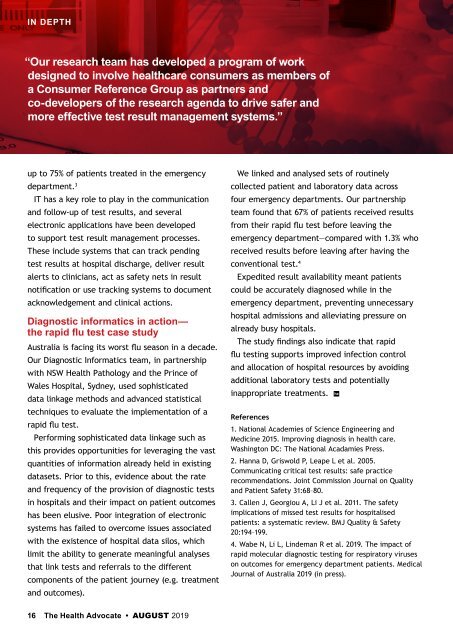The Health Advocate August 2019
You also want an ePaper? Increase the reach of your titles
YUMPU automatically turns print PDFs into web optimized ePapers that Google loves.
IN DEPTH<br />
“Our research team has developed a program of work<br />
designed to involve healthcare consumers as members of<br />
a Consumer Reference Group as partners and<br />
co-developers of the research agenda to drive safer and<br />
more effective test result management systems.”<br />
up to 75% of patients treated in the emergency<br />
department. 3<br />
IT has a key role to play in the communication<br />
and follow-up of test results, and several<br />
electronic applications have been developed<br />
to support test result management processes.<br />
<strong>The</strong>se include systems that can track pending<br />
test results at hospital discharge, deliver result<br />
alerts to clinicians, act as safety nets in result<br />
notification or use tracking systems to document<br />
acknowledgement and clinical actions.<br />
Diagnostic informatics in action—<br />
the rapid flu test case study<br />
Australia is facing its worst flu season in a decade.<br />
Our Diagnostic Informatics team, in partnership<br />
with NSW <strong>Health</strong> Pathology and the Prince of<br />
Wales Hospital, Sydney, used sophisticated<br />
data linkage methods and advanced statistical<br />
techniques to evaluate the implementation of a<br />
rapid flu test.<br />
Performing sophisticated data linkage such as<br />
this provides opportunities for leveraging the vast<br />
quantities of information already held in existing<br />
datasets. Prior to this, evidence about the rate<br />
and frequency of the provision of diagnostic tests<br />
in hospitals and their impact on patient outcomes<br />
has been elusive. Poor integration of electronic<br />
systems has failed to overcome issues associated<br />
with the existence of hospital data silos, which<br />
limit the ability to generate meaningful analyses<br />
that link tests and referrals to the different<br />
components of the patient journey (e.g. treatment<br />
and outcomes).<br />
We linked and analysed sets of routinely<br />
collected patient and laboratory data across<br />
four emergency departments. Our partnership<br />
team found that 67% of patients received results<br />
from their rapid flu test before leaving the<br />
emergency department—compared with 1.3% who<br />
received results before leaving after having the<br />
conventional test. 4<br />
Expedited result availability meant patients<br />
could be accurately diagnosed while in the<br />
emergency department, preventing unnecessary<br />
hospital admissions and alleviating pressure on<br />
already busy hospitals.<br />
<strong>The</strong> study findings also indicate that rapid<br />
flu testing supports improved infection control<br />
and allocation of hospital resources by avoiding<br />
additional laboratory tests and potentially<br />
inappropriate treatments. ha<br />
References<br />
1. National Academies of Science Engineering and<br />
Medicine 2015. Improving diagnosis in health care.<br />
Washington DC: <strong>The</strong> National Acadamies Press.<br />
2. Hanna D, Griswold P, Leape L et al. 2005.<br />
Communicating critical test results: safe practice<br />
recommendations. Joint Commission Journal on Quality<br />
and Patient Safety 31:68–80.<br />
3. Callen J, Georgiou A, Li J et al. 2011. <strong>The</strong> safety<br />
implications of missed test results for hospitalised<br />
patients: a systematic review. BMJ Quality & Safety<br />
20:194–199.<br />
4. Wabe N, Li L, Lindeman R et al. <strong>2019</strong>. <strong>The</strong> impact of<br />
rapid molecular diagnostic testing for respiratory viruses<br />
on outcomes for emergency department patients. Medical<br />
Journal of Australia <strong>2019</strong> (in press).<br />
16 <strong>The</strong> <strong>Health</strong> <strong>Advocate</strong> • AUGUST <strong>2019</strong>

















